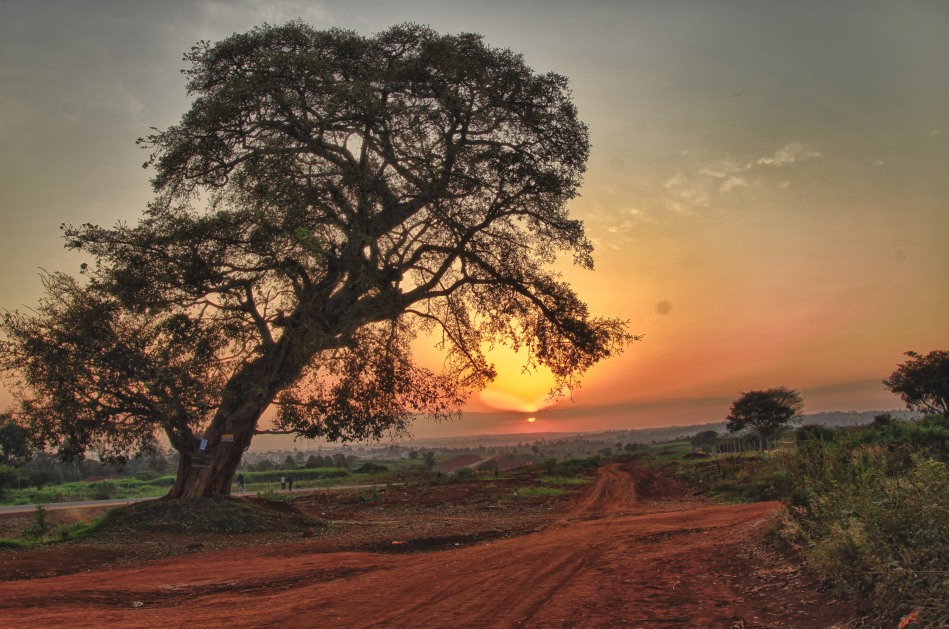Category: Kenya
December 20th, 2004 by Gaylord Njui Gitau
A bevy of dancers known as Ishiololo belted out, song after song, and left the audience in a trance craving for more. In line with the theme of the day, they mimicked drawing battle lines, unsheathed wooden swords and sang war songs to the crowd that had thronged the local stadium, which had seen many bulls lock horns.
This was Chemasisi, the village known more for non-performance than achievement. It was sandwiched between Ukololo hills, the home of the great god of thunder Umeme, and the habitation of Eshakala, the great god of wrath. It was well served with the great river Olmoloti, which served as the lifeline to the people: water to drink, bathing, swimming and watering points for the animals.
Chemasisi was also a battlefield and the river Olmoloti was a bone of contention between the two antagonistic gods, Umeme and Eshakala. Thunder always struck and wrath would follow in their battle for supremacy. Even the people at times would go for one another’s jugulars. Read more of this article »
Posted in Fiction, Kenya

September 20th, 2004 by Elizabeth Mumbi Waichinga
Mugumo is the name of a special sacred tree known to the Kikuyu community and many others in Kenya. Its name was inherited from the ancestors, and the ancestors inherited it from their ancestors.
For some reason, the holiness of this tree has survived the ages. Even a cultural invasion by foreigners -which Mugo Wa Kibiro prophesied about and influenced the dress code of the natives and gave them a foreign language- didn’t destroy the sacredness of the Mugumo tree. Several theories have evolved about this indigenous tree.
Some natives believe that going around this tree seven times would automatically change one’s sex. But no one has ever experienced this transformation. Others believe spirits of the ancestors and the living dead hover around this tree. In fact some have claimed to have heard and recognized voices of departed relatives.
Mugumo is a rare tree found only in big forests like Mount Kenya. The Kikuyu community inhabiting the slopes of mount Kirinyaga, which has since been renamed Mount Kenya, considers this tree their shrine. They use it to commemorate their land’s independence. Read more of this article »
Posted in Fiction, Kenya
May 9th, 2004 by Elizabeth Mumbi Waichinga
[This is a fable written to portray the sad state of care giving that still exists in Kenya in relation to Down syndrome and other disabilities.]
At the labor ward that night, everyone was smiling. Twelve years had passed since the Wambaras’ marriage day and, because they had no offspring, gossip had been raging in the village that “Wambaras’ wife must be barren.” Despite all the disappointment and rumors, the Wambaras got along well. They maintained hope that their patience and love of God would bear fruits, as the local priest taught.
Finally, after much prayer, Mrs. Wambaras had conceived and the gift the Wambaras had long been waiting for finally arrived: a baby boy. As he left his mother, the baby delivered a strong first cry of arrival, an assertion of being granted existence without his consent. As the doctor took the baby for examination, Mr. Wambaras looked at his wife, and both smiled irresistibly.
In the examination room holding the 3.5 kg baby in his left hand, the doctor grimaced and muttered inaudibly. Something was amiss. The baby had flattened facial features including bridge of the nose, bulging almond-shaped eyes, malformed hands and feet, and the palms had a palmer crease that clearly indicated his condition. “This boy,” he declared, “is not a normal child.” Read more of this article »
Posted in Fiction, Kenya
